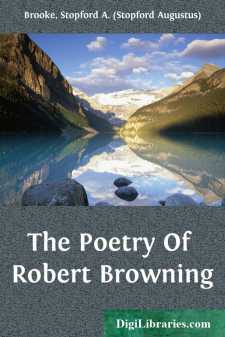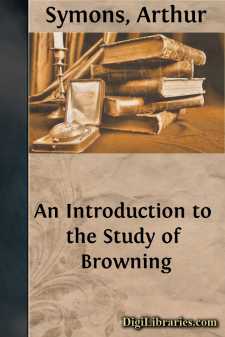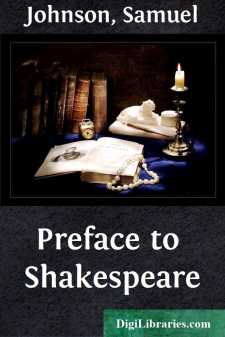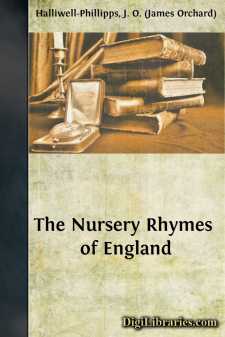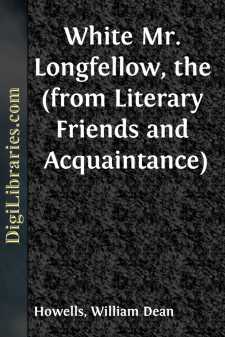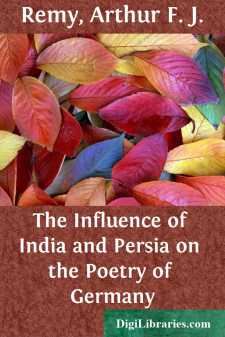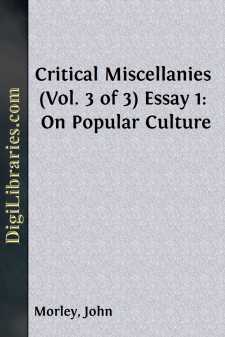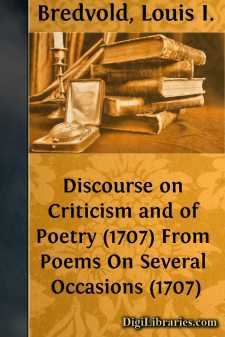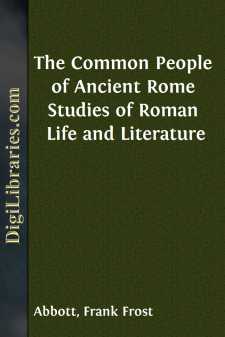Literary Criticism
- American 18
- Ancient and Classical 3
- Asian 1
- Australian & Oceanian 1
- Books & Reading 8
- Caribbean & Latin American 2
- Drama 2
- English, Irish, Scottish, Welsh 49
- European 7
- General 37
- Horror 1
- Humor 2
- Jewish 2
- Medieval 2
- Middle Eastern 3
- Poetry 7
- Renaissance 6
- Russian & Former Soviet Union 1
- Shakespeare 27
Literary Criticism Books
Sort by:
CHAPTER I BROWNING AND TENNYSON Parnassus, Apollo's mount, has two peaks, and on these, for sixty years, from 1830 to 1890, two poets sat, till their right to these lofty peaks became unchallenged. Beneath them, during these years, on the lower knolls of the mount of song, many new poets sang; with diverse instruments, on various subjects, and in manifold ways. They had their listeners; the Muses...
more...
by:
Arthur Symons
A BIBLIOGRAPHY OF ROBERT BROWNING The following list of the published writings of Robert Browning, in the order of their publication, has been compiled mainly from Dr. Furnivall's very complete and serviceable Browning Bibliography, contained in the first part of the Browning Society's Papers (pp. 21-71). Volumes of "Selections" are not noticed in this list: there have been many in...
more...
by:
Samuel Johnson
PREFACE TO SHAKESPEARE That praises are without reason lavished on the dead, and that the honours due only to excellence are paid to antiquity, is a complaint likely to be always continued by those, who, being able to add nothing to truth, hope for eminence from the heresies of paradox; or those, who, being forced by disappointment upon consolatory expedients, are willing to hope from posterity what...
more...
I. LD King Cole Was a merry old soul, And a merry old soul was he; He called for his pipe, And he called for his bowl, And he called for his fiddlers three. Every fiddler, he had a fiddle, And a very fine fiddle had he; Twee tweedle dee, tweedle dee, went the fiddlers. Oh, there's none so rare, As can compare With King Cole and his fiddlers three! [The traditional Nursery Rhymes of England...
more...
We had expected to stay in Boston only until we could find a house in Old Cambridge. This was not so simple a matter as it might seem; for the ancient town had not yet quickened its scholarly pace to the modern step. Indeed, in the spring of 1866 the impulse of expansion was not yet visibly felt anywhere; the enormous material growth that followed the civil war had not yet begun. In Cambridge the...
more...
by:
Julius West
INTRODUCTORYThehabit, to which we are so much addicted, of writing books about other people who have written books, will probably be a source of intense discomfort to its practitioners in the twenty-first century. Like the rest of their kind, they will pin their ambition to the possibility of indulging in epigram at the expense of their contemporaries. In order to lead up to the achievement of this...
more...
CHAPTER I. INTRODUCTION. Information of Mediæval Europe Concerning India and Persia—Travellers—India and Persia in Mediæval German Poetry. The knowledge which mediæval Europe had of India and Persia was mostly indirect, and, as might be expected, deficient both in correctness and extent, resting, as it did, on the statements of classical and patristic writers, on hearsay and on oral...
more...
by:
John Morley
The proceedings which have now been brought satisfactorily to an end are of a kind which nobody who has sensibility as well as sense can take a part in without some emotion. An illustrious French philosopher who happened to be an examiner of candidates for admission to the Polytechnic School, once confessed that, when a youth came before him eager to do his best, competently taught, and of an apt...
more...
Introduction What little is known of the life of Samuel Cobb (1675-1713) may be found in the brief article in the Dictionary of National Biography by W.P. Courtney. He was born in London, and educated at Christ's Hospital and at Trinity College, Cambridge, where he obtained the degrees of B.A., 1698, and M.A., 1702. He was appointed "under grammar master" at Christ's Hospital in 1702...
more...
How Latin Became the Language of the World How the armies of Rome mastered the nations of the world is known to every reader of history, but the story of the conquest by Latin of the languages of the world is vague in the minds of most of us. If we should ask ourselves how it came about, we should probably think of the world-wide supremacy of Latin as a natural result of the world-wide supremacy of the...
more...


